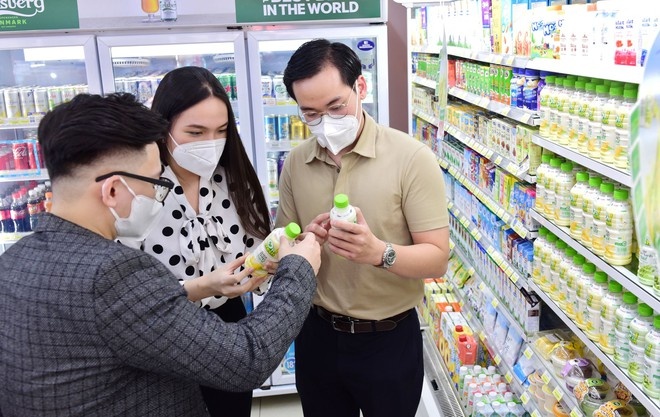FMCG companies quick to bounce back post-COVID-19
 |
| FMCG companies are eager to bounce back after COVID-19 |
Right after the easing of social distancing measures, KIDO Group has announced its new plans for different FMCG categories. The group, through its joint venture with Vinamilk, has officially launched fresh corn and green bean milk products in Vietnam. The group also made a comeback to the confectionery market six years after selling its snack business to Mondelez International. It has also launched fresh bakery products under KIDO’s Bakery brand.
These food and beverage products are distributed through the group's existing distribution system as well as at its newly-launched Chuk Chuk coffee and milk tea shops. The Chuk Chuk chain has started to sell beverages, milk tea, and cakes online since September. KIDO now plans to open 10 signature Chuk Chuk stores with the target of operating at least 100 outlets in Ho Chi Minh City by December.
In addition, KIDO also ramped up the production of cooking oil by 30 per cent against the same period last year for the upcoming Lunar New Year. The group also unveiled new ice-cream products.
KIDO is not alone in the FMCG segment in showing optimism post-COVID-19.
Cetin Murat, general manager of Turkish FMCG firm Hayat Vietnam, is upbeat about the outlook for the FMCG market in the upcoming months. “Although some restrictions remain, we are hopeful that the uptake of the vaccine rollouts will lessen the impacts on businesses,” he claimed.
At the moment, Hayat Vietnam has invested around $100 million and employs more than 500 people in Vietnam. The company continues to expand in accordance with its commitment to invest $250 million.
In addition, the firm also announced the launch of its leading diaper brand Molfix in Vietnam. The decision was made as 90 per cent of the global population growth during the next 50 years will be in Asia and Vietnam, with the baby diaper market expected to grow by double-digits during 2021-2027.
“Molfix is the fifth-largest diaper brand in the world, and Hayat is the fastest-growing company in this category. By launching Molfix in Vietnam, we are aiming high and hope to reach 30 per cent market share by 2025, a major goal for a brand fully made in Vietnam. However, the goal is based on our record of achievements in other markets,” Murat added.
Hayat has already some brands in Vietnam’s FMCG markets, such as Papia, Familia, and Bingo. The Turkish FMCG firm plans further expand further.
Meanwhile, Sakuko Store, a Japanese supermarket chain, has announced plans to expand from 33 to 60 stores by 2025. The company operates in seven FMCG segments, including mother and baby, cosmetics, food, healthcare, fashion, and stationery.
According to Cao Thi Dung, CEO of Sakuko, food and healthcare are the fastest-growing segments at Sakuko, reflecting the increasing health awareness of Vietnamese consumers. Thus, the company plans to diversify its product portfolio with food. Meanwhile, the firm increases its items in healthcare, targeting different customer groups.
Dung noted that customers’ consumption habits have changed significantly after a long period of social distancing. Customers slashed spending on family activities and luxury items while increasing purchases of necessities such as fresh food and packaged consumer goods.
In addition, consumers’ shopping habits have shifted from traditional to modern retail channels such as supermarkets, hypermarkets, mini supermarkets, and e-commerce.
“These changes have had a significant impact on the FMCG market, and created opportunities for businesses to change the structure of goods, expand their customer base, and complete customer care stages to create engagement,” Dung said.
In October, Nestlé Vietnam invested $132 million to double its processing capacity of high-quality coffee lines at the Nestlé Tri An factory in Dong Nai province.
The step is part of Nestlé’s vision to turn Vietnam into a production centre for packaged food and beverages because of the country’s skilled workforce and great work ethic.
According to market research firm Statista, the FMCG industry in Vietnam has been growing fast in recent years. Thanks to the country’s rapid economic development, people have more disposable income and an improved living standard with an increasing consumption rate of FMCG products.
Urbanisation has been another driver of the double-digit growth of the FMCG market. In 2020, the annual growth of retail sales of consumer goods in the country reached 6.8 per cent and was forecast to be at least nine per cent in 2021.
What the stars mean:
★ Poor ★ ★ Promising ★★★ Good ★★★★ Very good ★★★★★ Exceptional
 Tag:
Tag:
Related Contents
Latest News
More News
- Foreign leaders extend congratulations to Party General Secretary To Lam (January 25, 2026 | 10:01)
- 14th National Party Congress wraps up with success (January 25, 2026 | 09:49)
- Congratulations from VFF Central Committee's int’l partners to 14th National Party Congress (January 25, 2026 | 09:46)
- 14th Party Central Committee unanimously elects To Lam as General Secretary (January 23, 2026 | 16:22)
- Worldwide congratulations underscore confidence in Vietnam’s 14th Party Congress (January 23, 2026 | 09:02)
- Political parties, organisations, int’l friends send congratulations to 14th National Party Congress (January 22, 2026 | 09:33)
- Press release on second working day of 14th National Party Congress (January 22, 2026 | 09:19)
- 14th National Party Congress: Japanese media highlight Vietnam’s growth targets (January 21, 2026 | 09:46)
- 14th National Party Congress: Driving force for Vietnam to continue renewal, innovation, breakthroughs (January 21, 2026 | 09:42)
- Vietnam remains spiritual support for progressive forces: Colombian party leader (January 21, 2026 | 08:00)






















 Mobile Version
Mobile Version